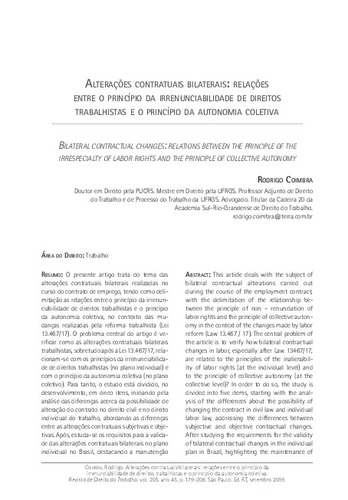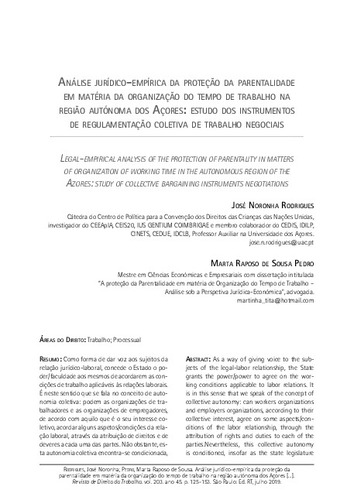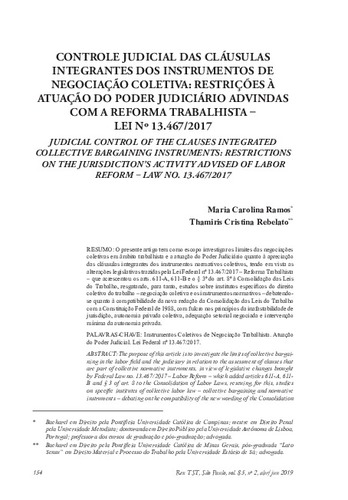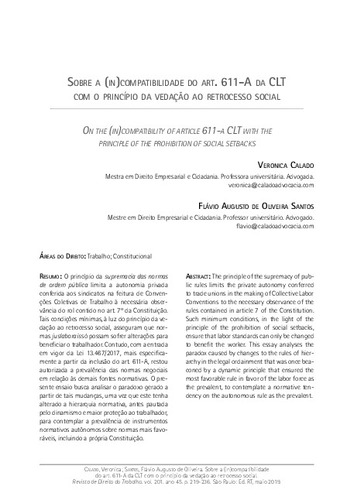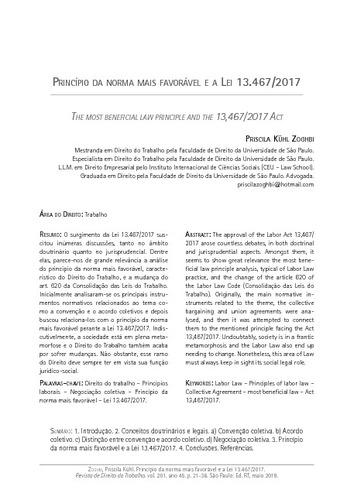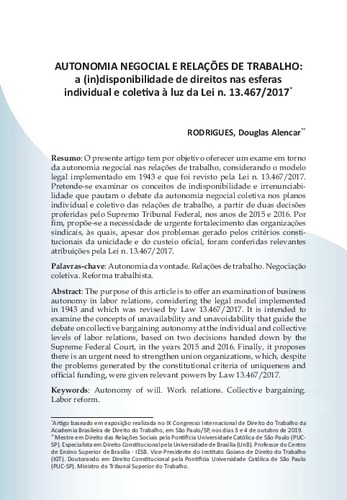Artigo de periódico
Alterações contratuais bilaterais: relações entre o princípio da irrenunciabilidade de direitos trabalhistas e o princípio da autonomia coletiva
| dc.contributor.author | Coimbra, Rodrigo | |
| dc.date.accessioned | 2019-11-27T12:34:34Z | |
| dc.date.available | 2019-11-27T12:34:34Z | |
| dc.date.issued | 2019-09 | |
| dc.identifier.citation | COIMBRA, Rodrigo. Alterações contratuais bilaterais: relações entre o princípio da irrenunciabilidade de direitos trabalhistas e o princípio da autonomia coletiva = Bilateral contractual changes: relations between the principle of the irrespecialty of labor rights and the principle of collective autonomy. Revista de direito do trabalho, São Paulo, v. 45, n. 205, p. 179-208, set. 2019. | pt_BR |
| dc.identifier.uri | https://hdl.handle.net/20.500.12178/165312 | |
| dc.description.abstract | [por] Trata do tema das alterações contratuais bilaterais realizadas no curso do contrato de emprego, tendo como delimitação as relações entre o princípio da irrenunciabilidade de direitos trabalhistas e o princípio da autonomia coletiva, no contexto das mudanças realizadas pela reforma trabalhista (Lei n. 13.467/17). O problema central do artigo é verificar como as alterações contratuais bilaterais trabalhistas, sobretudo após a Lei n. 13.467/17, relacionamse com os princípios da irrenunciabilidade de direitos trabalhistas (no plano individual) e com o princípio da autonomia coletiva (no plano coletivo). Para tanto, o estudo está dividido, no desenvolvimento, em cinco itens, iniciando pela análise das diferenças acerca da possibilidade de alteração do contrato no direito civil e no direito individual do trabalho, abordando as diferenças entre as alterações contratuais subjetivas e objetivas. Após, estuda-se os requisitos para a validade das alterações contratuais bilaterais no plano individual no Brasil, destacando a manutenção da redação do art. 468, caput, da CLT, que não sofreu alteração pela reforma trabalhista. A seguir, aborda-se o princípio da irrenunciabilidade dos direitos trabalhistas (no plano individual) e, logo após, o princípio da autonomia coletiva (no plano coletivo). Posteriormente, analisa-se a relativização do princípio da irrenunciabilidade de direitos trabalhistas no plano coletivo pela influência do princípio da autonomia coletiva, alargado pela Lei n. 13.467/17, que, entre outras mudanças, passou a prever a prevalência no negociado coletivamente sobre o legislado. Entre as conclusões, tem-se que nas alterações contratuais, pela sua dinâmica, aparece de forma muito intensa a intersecção entre os planos coletivo e individual. As normas coletivas integram o contrato individual de trabalho. A intersecção entre o plano coletivo e o plano individual ganhou novos contornos e ainda mais importância a partir das mudanças apontadas no artigo, trazidas pela reforma trabalhista de 2017: de um lado, a Lei n. 13.467/17 concedeu mais abertura, profundidade e complexidade para o princípio da autonomia coletiva; de outro lado, a regra geral protetora dos empregados sobre as alterações contratuais trabalhistas no plano individual permanece no caput do art. 468 da CLT, protegendo os trabalhadores das alterações contratuais que lhes sejam prejudiciais. | pt_BR |
| dc.description.abstract | [eng] This article deals with the subject of bilateral contractual alterations carried out during the course of the employment contract, with the delimitation of the relationship between the principle of non – renunciation of labor rights and the principle of collective autonomy in the context of the changes made by labor reform (Law 13.467 / 17). The central problem of the article is to verify how bilateral contractual changes in labor, especially after Law 13467/17, are related to the principles of the inalienability of labor rights (at the individual level) and to the principle of collective autonomy (at the collective level)? In order to do so, the study is divided into five items, starting with the analysis of the differences about the possibility of changing the contract in civil law and individual labor law, addressing the differences between subjective and objective contractual changes. After studying the requirements for the validity of bilateral contractual changes in the individual plan in Brazil, highlighting the maintenance of the wording of art. 468, caput, of the CLT, which was not altered by the labor reform. Next, the principle of non-renunciation of labor rights (at the individual level), and soon after, the principle of collective autonomy (at the collective level) is discussed. Subsequently, we analyze the relativization of the principle of non-renunciation of labor rights in the collective plan by the influence of the principle of collective autonomy, extended by Law 13467/17, which among other changes came to predict the prevalence in the collective bargaining over the legislated. Among the conclusions one has in the contractual alterations, due to their dynamics, the intersection between the collective and individual planes appears very intensely. The collective norms are part of the individual work contract. The intersection between the collective plan and the individual plan has gained new contours and even more importance from the changes pointed out in the present article brought about by the labor reform of 2017: on the one hand, Law 13467/17 granted more openness, depth and complexity to the principle of collective autonomy; On the other hand, the general protective rule of the employees on the contractual changes in labor at the individual level remains in the caput of art. 468 of the CLT, protecting workers from contractual changes that are harmful to them. | pt_BR |
| dc.description.tableofcontents | Diferenças da possibilidade de alteração do contrato no direito civil e no direito individual do trabalho: alterações contratuais subjetivas e objetivas -- Alteração contratual bilateral no plano individual -- Princípio da irrenunciabilidade dos direitos trabalhistas no plano individual -- Princípio da autonomia coletiva -- Relativização da irrenunciabilidade no plano coletivo: mudanças decorrentes da Lei n. 13.467/17. Prevalência no negociado coletivamente sobre o legislado | pt_BR |
| dc.language.iso | pt_BR | pt_BR |
| dc.relation | Brasil. Lei n. 13.467, de 13 de julho de 2017 | pt_BR |
| dc.relation.ispartof | Revista de direito do trabalho: vol. 45, n. 205 (set. 2019) | pt_BR |
| dc.relation.uri | https://www.lexml.gov.br/urn/urn:lex:br:federal:lei:2017-07-13;13467 | pt_BR |
| dc.subject | Contrato de trabalho, alteração | pt_BR |
| dc.subject | Autonomia da vontade | pt_BR |
| dc.subject | Contrato, alteração | pt_BR |
| dc.subject | Negociação coletiva de trabalho | pt_BR |
| dc.subject | Reforma trabalhista | pt_BR |
| dc.subject | Renúncia (direito do trabalho) | pt_BR |
| dc.title | Alterações contratuais bilaterais: relações entre o princípio da irrenunciabilidade de direitos trabalhistas e o princípio da autonomia coletiva | pt_BR |
| dc.title.alternative | Bilateral contractual changes: relations between the principle of the irrespecialty of labor rights and the principle of collective autonomy | pt_BR |
| dc.relation.references | Brasil. Consolidação das leis do trabalho (CLT) (1943), art. 442; art. 443; art. 468; art. 611-A; art. 611-B; art. 620 | pt_BR |
| dc.type.genre | Artigo de periódico | pt_BR |
| dc.identifier.rvbisys | 001159043 | |
| dc.relation.ispartoflink | https://hdl.handle.net/20.500.12178/164636 | pt_BR |
| dc.relation.referenceslink | https://www.lexml.gov.br/urn/urn:lex:br:federal:decreto.lei:1943-05-01;5452 | pt_BR |
Coleção
-
Artigos9570


